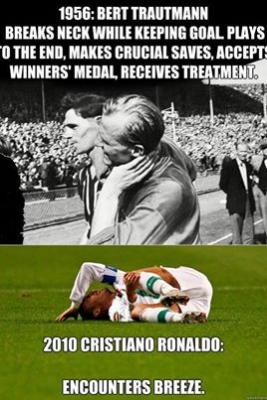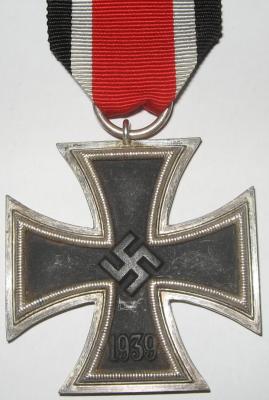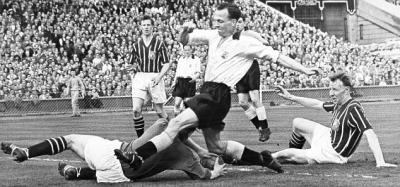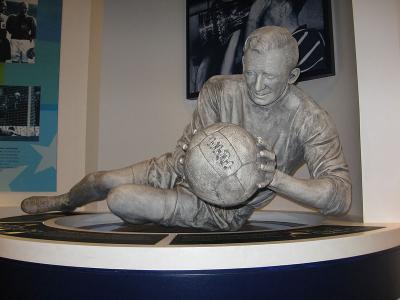The Story Of Bert Trautmann
The other day I posted this picture on this site and on Facebook:
Although I found the image amusing as it's certainly true to a point, it got me thinking - how on earth could anybody play with a broken neck? Did he know how serious it was? What kind of a man was he to think "my neck's broken but I'm fine"?
As a result I did some research on Bert Trautmann's career and life and wow! Bert Trautmann's is certainly a remarkable story.
I have done my best to re-write his story here for PON, so I hope you enjoy ![]()
Bernhard Carl Trautmann, or as he became more affectionatly known as - Bert Trautmann, was born in Bremen on 22nd October 1923. He lived with his Father who was a factory worker at the docks, and his Mother. The Treeaty of Versailles which was signed at the end of the First World War had left Germany in a pretty sorry state - they had been relying in loans from the USA to keep up with their war reperation payments, but the Wall Street Crash meant that they no longer got those loans. The bleak economic climate in the 1930s left the Trautmann family with no choice other than to sell their home and move into an apartment.
The young Bert Trautmann had a keen interest in playing football and handball from an early age. He joined Football Club Blau Und Weiss, and took to playing with much enthusiasm.
Bert joined a group called the Jungvolk which was a precurser to the Hitler Youth. The following year he won several Junior athletics events which led to him being awarded a certificate for athletic excellence signed by the German President Paul Von Hindenburg.
When the Second World War began, Trautmann was working as a mechanic but he joined the Luftwaffe as a radio operator in 1941. However he didn't show much apitude for radio work during his training so he went off to become a Paratrooper instead.
He served in Poland although his regiment were stationed far behind the front line, which resulted in boredom. Therefore they resorted to playing a lot of sports and practical jokes. One of those practical joked backfired on Bert as it resulted in a Staff Sergaent burning his arms.
Trautmann was court-martialled and given a three month prison sentence. However he came down with Acute Appendicitis so spent most if his sentence in a military hospital.
Following his release he joined up with German forces in Ukraine, where the German advance had been halted due to the adverse weather conditions. Hit and run attacks on the Soviet Forces became the focus for Trautmann's unit, and he was soon promoted to Corporal.
In 1942 small advances were made but Trautmann's unit were hit hard by a Soviet counter-attack. By the time his unit were withdrawn from the Eastern Front, less than 300 of the original 1,000 men in the unit were still alive.
Trautmann himself won five medals for his actions on the Eastern Front - including the Iron Cross.
Following his withdrawel from the Eastern front, Trautmann was promoted to Sergaent, and he became part of a unit which was made up of the remnents of other units which had been almost completely destroyed on the Eastern front. His new unit were stationed in France in anticipation of an allied invasion. In 1944, he survived the bombing of Kleve, and he decided to head back to Breman as he had no unit left.
By now, German soldiers caught attempting to flee were being excecuted as deserters, so Trautmann had to try and avoid soldiers from both sides. Unfortunatly, just a few days into his journey home he was captured by a couple of U.S soldiers in a barn. They soon came to the conclusion that Trautmann had no useful information to give them so they marched him out of the barn. Trautmann, thinking he was about to be excecuted, made a bid for freedom. He fled his captors and jumped over a fence. Unfortunatly he had the miss-fortune of landing right at the feet of a British soldier who is said to have greeted him with "hello fritz, fancy a cuppa tea?".
That was Trautmann's third attempt at freedom during the war. Earlier in the war he had been caputured on the Eastern front by the Russians and he was captured again by members of the French Resistance, but he escaped both times. This time though he wasn't so lucky.
At first he was held in Belguim before being transfered to Essex where he was interrogated.
Trautmann was a volunteer soldier who had been essentially brainwashed by the Nazis from a young age. He was therefore classed as a catergory "C" prisoner, meaning he was regarded as a Nazi. He was then transferred to a Prisoner of war camp near Northwich in Cheshire. Soon he was downgraded to a catergory "B" prisoner, meaning he was no longer regarded as a Nazi. Follwing this he was transferred to another POW camp in Ashton-In-Markerfield, Lancashire.
Football matches were regularly held in the camp as the prisoners tried to keep themselves entertained. In these matches, Trautmann usualy played outfield. However, in an organised match against a local amateur side, Trautmann picked up an injury while playing at centre half and he asked to swap positions with the goalkeeper. From that day forth, he played as a goalkeeper.
It was also during his time at the POW camp that he started getting called "Bert" as the English guards had trouble pronouncing his name.
The POW camp at which Trautmann was held closed in 1948 - three years after the formal surrender of German forces and the end of the War. Trautmann decided to stay in Britian - working on a farm, and on bomb disposal in th Merseyside town of Huyton.
He also began playing football for amateur club St Helens Town in the Liverpool County Combination League.
Over the course of the 1948-49 season, Trautmann's stock as a goalkeeper grew, and big crowds began turning up to see him play, including a record 9,000 in the final of the local Mahon Cup final.
As the 1949-50 season progressed, league clubs began to take notice of Trautmann. First Division club Manchester City offered Bert a contract in October 1949, which he signed - joining the club initially as an amateur but soon turning professional.
The signing of a former member of the Luftwaffe did not go down well among many Manchester City supporters. Many season ticket holders threatened a boycott, and the club was bombarded with protest letters not just from the people of Manchester, but from people all over the country.
The antagonism of fans was not the only thing Trautmann was up against. He was signed as a replacement to Frank Swift, who was regarded as one of the best goalkeepers in the club's history.
City's captain Eric Westwood was a D-Day veteran, and although he privatly expressed many doubts about the signing of Trautmann, he publically welcomed Trautmann to the club saying "there's no war in this dressing room".
Bert made his first team debut for Manchester City in 19th November in a game against Bolton Wanderers. He put in a competent display in his first game which silenced some of the doubters, and fans began to realise his talent.
He did however recieve a lot of abuse from opposition fans at away matches which had an affect on his concentration in his first few games. In December of 1949 he shipped seven goals at Derby County.
Manchester City travelled to Fulham in January 1950. This was to be Trautmann's first visit to London, and the game recieved a lot of coverage with most of the country's media at the time being based in London. Due to the heavy damage London suffered as a result of Lufwaffe bombing raids during the War, Trautmann was a target of deep hatred for the crowd who yelled "kraut" and "Nazi", among other things at him. City were not having a great season and they were expected to lose heavily, but a string of fine saves from Trautmann meant City only lost the match 1-0. At full time, Trautmann recieved a standing ovation from the crowd and he was applauded off the field by both teams.
City continued to struggle in the league and suffered relegation from Division 1 - finishing second bottom on 29 points, 3 points from safety (2 points for a win back then).
The following season, Man City were promoted back to Division 1 finishing second in the second division. Over the new few years, Trautmann really began to establish himself as a top goalkeeper, and he played in all-but 5 of City's next 250 league games.
Come 1952, his reputation had spread back to Germany, and Schalke made a £1,000 offer for his services. City refused the offer, and were quoted in the press as saying they believed Trautmann to be worth twenty times what Schalke had offered.
In 1955, Manchester City reached the FA Cup final where they would face Newcastle United. Trautmann became the first ever German to play in an FA Cup final. It's said that the City team were gripped by nerves before the game, and they fell behind after less than a minute. Things got worse on 18 minutes when Jimmy Meadows was injured, leaving City with only 10 men (no subs back then).
Now City had made the final largly thanks to Trautmann's ability start attacks by throwing the ball out to the wingers as oppose to simply kicking the ball as far down the field as possible. But the loss of a player limited this ability. Although City did equalise during the first half, they struggled during the second half and were eventually beaten 3-1.
They reached the final again though the following year, this time to face Birmingham City. Shortly before the final, Trautmann hadd become the first goalkeeper ever to win the Football Writers Association Footballer of the Year award, and two days later he stepped out onto the hallowed turf at Wembley for the Cup final, and a match that would cemment his legacy as one of football's greats.
This time, Manchester City were more settled and they took the lead after just three minutes. Birmingham soon equalised after a quarter of an hour. It stayed 1-1 but then midway through the second half, Manchester City bagged two goals in two minutes to take control of the game. From then on Birmingham threw everything forwards. With 15 minutes remaining, Trautmann dived at the ball but collided heavily with Birmingham's Peter Murphy. Trautmann's neck smashed against Murphy's knee knocking him briefly unconcious.
Remember, no subs were permitted in those days so although dazed and unsteady on his feet - Trautmann played on. For 15 more minutes he defended his goal, bravely denying Murphy once more to help Manchester City hold on for a 3-1 victory. Trautmann was the hero for his spectacular saves towards the end of the game.
These are the television highlights of that final:
Trautmann's neck was still causing him pain as he went up to collect his winners medal, Prince Phillip commented on his crooked neck. Nevertheless, Trautmann attended the post-match banquet that evening despite not being able to move his head. He went to bed that night expecting the pain to go away after some rest. It didn't, so he went to St George's Hospital the following day where he was told he simply had a crick in his neck which would soon go away. Three days later, he got an opinion from a second doctor back in Manchester, and X-Rays showed that Trautmann had dislocated five Vertebrae in his neck, one of which was cracked in half. The third Vertebrae had wedged against the second, which had prevented further, pottentially fatal damage.
Trautmann took several months to recover, which resulted in him missing the first part of the 1956-57 season. In early December, he played in a couple of reserve team games but he clearly lacked confidence. Nevertheless, he was restored to the first team on December 15th, but he conceeded three goals against Wolves.
He continued to struggle, and some began to call for him to retire. Some even criticised Manchester City for forcing Trautmann to play when he had not fully recovered.
The following season, City became the first, and thus far only English league club to score 100 goals, and concede 100 goals in the same season. They finished 5th in the First Division, and Trautmann played on 34 of City's 42 league games that season. He only kept two clean sheets that season, and he shipped 8 at Leicester in an 8-4 defeat. City fans certainly got their moneys worth as far as the entertainment on offer was concerned that season!
Overall, between 1949 and 1964, Bert Trautmann played in 545 matches for Manchester City. His City career finished with a testimonial game between a joint Manchester City & Manchester United XI which included the likes of Bobby Charlton and Dennis Law, against an England team that included Stanley Matthews and Jimmy Armfield. The official crowd for his testimonial was 47,000 although it was thought to be more along the lines of 60,000.
Although he had planned to retire after his testimonial, Trautmann briefly joined Wellington Town. He had lost some of his agility but he proved he could still pull in the punters on his debut for the club at Hereford. However in just his second game for the club, Trautmann was sent off for violant conduct, and he never played again.
After a few months pondering his options, Bert recieved a telephone call from the Stockport County chairman Victor Bernard, who offered him the chance to become the club's general manager. Stockport were struggling both financially and in terms of league position, and the appointment of Trautmann was an attempt to improve the club's image.
Many of the club's fans, and indeed many local people also supported one of the two Manchester clubs, so between them - Trautmann and Bernard decided to move all of Stockport's home games to Friday night's in an attempt to boost revenue from extra support. Whilst that worked, the performances of the team didnt improve much, and in 1966 Trautmann resigned after a falling out with Bernard.
In 1967 and 1968 Trautmann managed German club Prussia Munster, and he guided them to a 13th place finish in the German second tier. He also had a short spell at Opel Russelsheim.
Following that, the German FA employed Trautmann as a development worker and sent him to countries without a football structure. At first he worked in Burma where he enjoyed two years as national team coach in which they qualified for the 1972 Munich Olympics, and they won the President's Cup - which was a competition contested between South-East Asian countries.
He also worked in Tanzania, Pakistan, Liberia and Yemen until 1988 when he retired and settled in Spain.
Now you might have thought that Trautmann would have enjoyed a succesfull International career too given his sucess at Manchester City. He was a renowned shot stopper who saved 60% of the penalties he faced. But actually, despite being recognised as one of the world's top goalkeepers at the time, Trautmann never played for his country. He had met with the German national coach Sepp Herberger in 1953 and was told that the travel expenses, coupled with the pottential political implications of selecting a player who did not play in Germany were the reasons why he could not be selected.
Trautmann's only international experience came when the Football League decided to include foreign players in Football League representative matches. Trautmann captained the Football League against the Irish League and he also played against the Italian League.
As a result of this Trautmann missed out on the 1954 World Cup which West Germany won, and thats a real shame. Many people these days claim that a player cannot really be classed as a true great unless they have achieved success at International level as well as club level. You can see their point, but to discount Trautmann as a legend I think is wrong. Not only was he a fantastic shot stopper, but he also changed the goalkeepers role to an extent with his ability to start attacks from throwing the ball out wide, at a time when it was perfectly acceptable for keepers to simply kick the ball as far down the pitch as they could. And he won the public over too, which must have taken some doing.
Gordon Banks cited Trautmann as a big influence on his playing style.
The media have recognised Trautmann's reputation numerous times. The Daily Mail ranked Trautmann as the unofficial 19th best goalkeeper of all time, while the TV channel ESPN ranked his diving save at Peter Murphy's knee which resulted in him breaking his neck as the best ever FA Cup save.
There is also a statue of Trautmann inside the main reception at Manchester City's Etihad Stadium:
His reputation was again recognised in 2004 when he was awarded an OBE for his work in Anglo-German relations, and the following year he was inducted into the National Football Museum's Hall of Fame.
I don't think anybody could possibly deny Trautmann his place in history. Yes, his only honour as a player on the pitch was that 1956 FA Cup success and no he never played for his country. But you have to look at the bigger picture. Look at where he came from, what he went through, his road to success. The obstacles he had to overcome to reach the heights he reached. His immense bravery in that Cup final should, and probably will be remembered forever.
I've spent quite a few hours reading all sorts of stories and researching Trautmann's career in order to put this blog together, and it's taken me two days to put the whole thing together. I really wanted to write something that would do the great man justice and I hope I've done that, because Bert Trautmann is an inspiration, a legend, and a true great.
Thanks for reading, I hope you enjoyed it and hopefully found it interesting ![]()










Recommended Comments